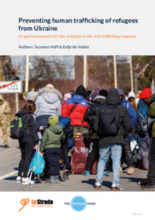The Russian invasion of Ukraine has led to the largest movement of people in Europe since World War II. Those who are fleeing the war in Ukraine are in an extremely vulnerable position. Experience from conflicts worldwide shows that the instability and turmoil created by war is fertile ground for traffickers seeking to exploit the vulnerability of internally displaced people and refugees.
In the weeks since the war started in Ukraine, there has already been evidence of human trafficking activity. Requests to support potentially trafficked people in countries bordering Ukraine, and in other European countries, have already been received by anti-trafficking organisations. National law enforcement bodies are reporting suspicious behaviour that could indicate human trafficking. Hotlines are receiving increased levels of calls for advice.
While it is too early to quantify the scale of the problem, the risks are clear – and it is likely that these risks will increase in the coming period, as the war continues, more people are internally displaced, access to services and livelihoods becomes more precarious, and millions of refugees face the need to settle for longer periods in other European countries and begin to access the labour market.
This report aims to provide a rapid assessment of the risks of trafficking and exploitation created by the war in Ukraine and the gaps in the current anti-trafficking response, in order to identify what needs to be done now to reduce and prevent trafficking before it is too late.
This rapid assessment is based on desktop research; interviews/discussions with organisations, experts and participants in the anti-trafficking response including volunteers, translators, refugees, and displaced people; and a field visit to Poland. The research was conducted in March and April 2022. While this is a fast-moving and evolving situation, it is hoped that this report, and its recommendations for governments, organisations and donors, can contribute to the development of a comprehensive anti-trafficking response to address the potential risks of trafficking faced by people fleeing from the war in Ukraine.

